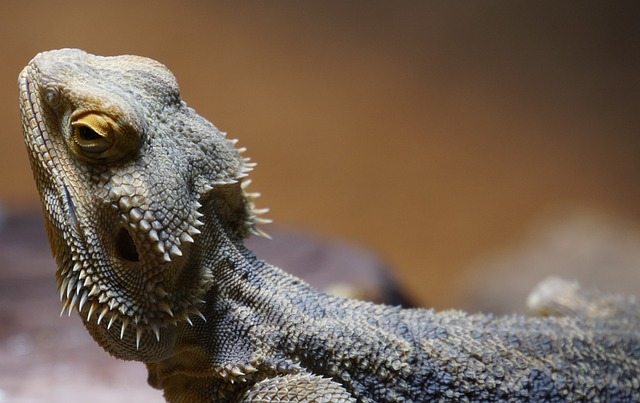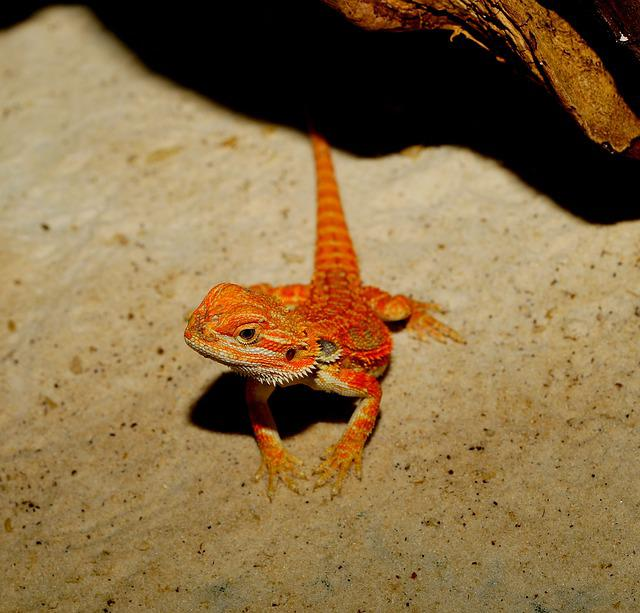Can bearded dragons hear? This is a question that many people have, and the answer is yes, bearded dragons can hear. However, their hearing abilities are not as good as those of humans or other animals but they can recognize their owners’ voice. In this blog post, we will discuss how bearded dragons hear and what they can hear. We will also look at some of the implications of this for bearded dragon owners.
About Bearded Dragons

Bearded dragons are native to Australia and have beards on their necks that give them their name. The spines on their necks resemble a beard, hence the name.
Most bearded dragons can grow to be up to 2 feet long and live for 15 years or more in the wild. Bearded dragons eat both plants and animals. Their diet in the wild is mostly insects, but they can also be fed vegetables and fruits in captivity.
Why Do People Like To Keep Bearded Dragons As Pets?
Bearded dragons make good pets because they are low maintenance and can be easily cared for. Bearded dragons are not known to bite humans, which makes them safe to keep around children. They are also not known to carry diseases that can be transmitted to humans.
Bearded dragons can be easy to care for, as they do not need to be exercised or taken on walks. They can also live in a small enclosure, such as a terrarium. Bearded dragons are interesting to watch, as they have many unique behaviors. For example, they can change the color of their skin to show their emotions. They can also puff out their beard when they are angry or scared.
How Can Bearded Dragons Hear?
Bearded dragons can hear because they have ear openings on the sides of their heads. These ear openings are connected to the ear canals, which lead to the eardrums.
The ear canals of bearded dragons are very short, which limits their hearing abilities. They can only hear sounds that are within a certain frequency range. For comparison, humans can hear sounds that are within a frequency range of 20 Hz to 20 kHz. Bearded dragons can only hear sounds that are within a frequency range of 500 Hz to 4000 Hz.
Can Bearded Dragons Hear?
Bearded dragons can hear, but their hearing is not as good as that of humans or other animals. This is because they have only one ear opening, which is located on the side of their head.
The ear opening is covered by a scale, which protects the ear from dirt and debris. The scale also helps to amplify sound waves, which helps the bearded dragon to hear better.
Bearded dragons can hear frequencies in the range of 500 Hz to 4000 Hz. This means that they can hear most human voices, but they cannot hear high-pitched sounds.
What Can Bearded Dragons Hear?

Bearded dragons can hear low-pitched sounds and some high-pitched sounds. They cannot hear all high-pitched sounds, such as dog whistles. However, they can hear some high-pitched noises, such as the sound of crickets chirping.
Do Bearded Dragons Like Music?
There is no definitive answer to this question, as not all bearded dragons are the same. Some bearded dragons seem to enjoy listening to music, while others do not appear to react to it at all.
If you want to play music for your bearded dragon, it is best to choose calm and relaxing music. classical music or nature sounds may be a good choice. Avoid loud and jarring music, as it could stress your bearded dragon out.
Implications for Bearded Dragon Owners
Bearded dragons can hear, but they may not be able to hear you if you call their name from another room, however, bearded dragons recognize your voice.
If you want to get your bearded dragon’s attention, it is best to make sure that you are in the same room as them. You can also try waving your hand or making a loud noise.
Bearded dragons may also be startled by sudden noises. This means that you should avoid playing loud music or having loud conversations near them. If you have other pets, such as dogs or cats, it is best to keep them away from your bearded dragon.
Bearded dragons are interesting and unique pets. If you decide to get one, it is important to do your research so that you can provide them with the best possible care.
Why Hearing Is Important To A Bearded Dragon?

Hearing is important to a bearded dragon because it helps them to communicate with other bearded dragons. It also helps them to find food and avoid predators.
Bearded dragons use their sense of hearing to communicate with each other by making sounds that are too low for humans to hear. These sounds can indicate when they are happy, sad, angry, or scared.
Bearded dragons also use their sense of hearing to find food. They can hear the sound of insects crawling on the ground, which helps them to locate their prey. A stressed bearded dragon can also hear the sound of predators approaching, which helps them to avoid being eaten.
Hearing sound can help many bearded dragons to determine the direction that it is coming from. This can be helpful when they are trying to find food or avoid predators.
Conclusion
Bearded dragon owners should be aware that their pet can hear them and other sounds in the environment. This means that they should avoid making loud noises near their bearded dragon. They should also avoid playing loud music or having loud conversations near their pet.
If they have other pets, such as dogs or cats, they should keep them away from their bearded dragon. Bearded dragons are interesting and unique pets that require special care and attention.
Do you have a bearded dragon? Have you ever noticed them reacting to sound? Let us know in the comments!
Related Articles
How To Play With A Bearded Dragon
What Is A Fancy Bearded Dragon?
What Is A Dunner Bearded Dragon?

